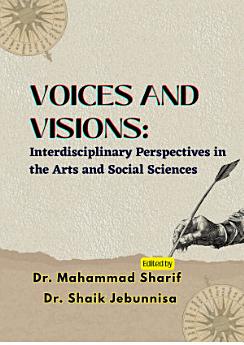Voices and Visions: Interdisciplinary Perspectives in the Arts and Social Sciences
Über dieses E-Book
The chapters address themes including identity, resistance, memory, and transformation, illustrating how the arts function both as a mirror of societal realities and a critique of them. The editors have curated a rich collection of contributions that emphasize the value of interdisciplinary dialogue, enhancing our understanding of complex human experiences.
Blending theoretical rigor with narrative depth, this collection serves as an essential resource for academics, researchers, and students interested in examining the evolving relationship between artistic expression and the social sciences.
Bewertungen und Rezensionen
Autoren-Profil
Dr. Mahammad Sharif is a distinguished faculty member in the Department of History at the University College of Arts and Social Sciences, Mahatma Gandhi University, Nalgonda. Renowned for his academic excellence, impactful research, and dedication to student development, he holds a Ph.D. in History from Osmania University, Hyderabad, and brings extensive teaching experience to his role.
Dr. Sharif’s research interests encompass Telangana History, Modern Indian History, World History, and Medieval History, with a particular focus on colonialism, nationalism, and socioeconomic transformation in India. His work is marked by interdisciplinary depth, integrating insights from sociology, political science, and economics. His publications on medieval India and global trade relations reveal the intricate connections between India’s historical developments and broader world contexts.
He has authored and edited several acclaimed academic books and chapters, contributing meaningfully to scholarly discourse and enhancing curricular relevance. Beyond his academic pursuits, Dr. Sharif actively promotes student welfare and civic engagement through his roles as NSS Programme Officer and a member of the Anti-Ragging Committee. He also serves as an Executive Committee (EC) member of the Telangana History Congress.
A respected scholar and speaker, Dr. Sharif collaborates with national and international institutions, embodying a commitment to interdisciplinary research, academic integrity, and social responsibility. His unwavering dedication to teaching, scholarship, and community service makes him a valued contributor to the academic community.
Dr. Jebunnisa S.K. is a distinguished historian with a robust academic foundation in modern Indian history, with a particular emphasis on the socio-political conditions of marginalized communities. She earned both her M.A. and Ph.D. in History from Osmania University, Hyderabad—an institution renowned for its academic excellence.
Dr. Jebunnisa’s research provides in-depth and critical insights into the historical experiences, systemic challenges, and evolving roles of underrepresented groups in post-independence India. Her scholarly work reflects a strong commitment to inclusive historical narratives and the exploration of neglected voices in historiography.
A passionate educator, she began her academic career teaching undergraduate history courses before joining the Department of Education as a School Assistant (Social Studies) on October 19, 2009. She currently continues in this role in the Suryapet district of Telangana, where she plays a vital role in shaping the understanding of social sciences among young learners.
Her academic contributions include the publication of more than ten research papers in reputed national and international journals, alongside numerous presentations at academic conferences and seminars. Her teaching interests span modern Indian history and medical history, underscoring her diverse intellectual engagements.
Dr. Jebunnisa’s dedication to research, education, and inclusive historical inquiry makes her a valuable voice in contemporary historiographical discourse.








